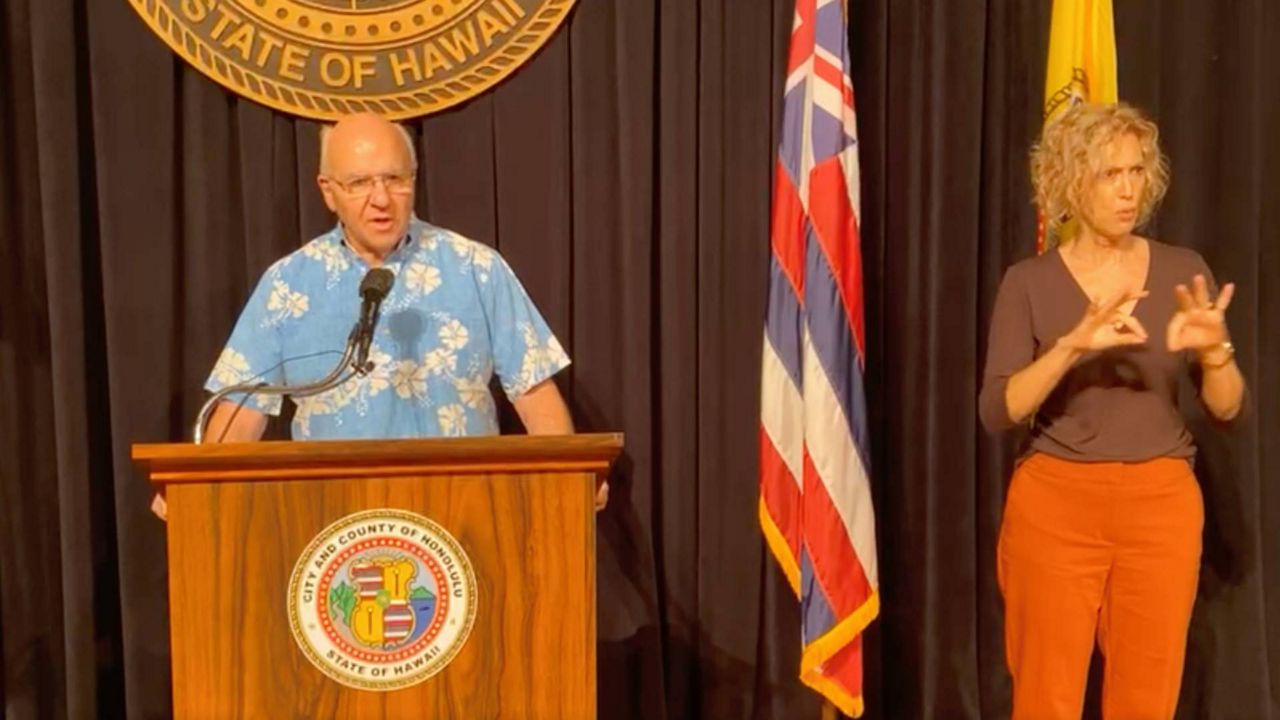HONOLULU — With COVID-19 case counts soaring across the island of Oahu, the mayor said large indoor gatherings would be restricted to 50% capacity starting Monday. The new coronavirus-related restriction will be in place until the end of January.
Honolulu Mayor Rick Blangiardi said during a press conference on Wednesday that “the only restriction that we're going to do” is restricting large indoor gatherings to 50% capacity. “If you're going to have 1000 people, you need to be in a venue that holds 2000,” he said.
No changes were made to small indoor gatherings or outdoor gatherings.
Blangiardi said he would prefer establishments make their own decisions about closing down or limiting guests, which he called “soft lockdowns.” For example, the Oahu Interscholastic Association announced Tuesday that they would not be allowing spectators until further notice.
The mayor also encouraged residents to get vaccinated and booster shots.
He said he is working with health care providers to expand access to vaccinations.
Dr. Jill Hoggard Green, the president of The Queen’s Health Systems, spoke Wednesday at the Honolulu mayor’s press conference and said they hope to increase vaccination rates by 50%. She said they are “on target to make sure that we can double [vaccinations] by next week.”
She also said the most important thing individuals can do to safeguard themselves and their families is to get vaccinated with a booster.
“This variant is interesting in that it can spread really fast,” said Green. “Now, all the reports say it's less severe in terms of being an illness, but the fact that it moves so rapidly — some individuals could be impacted.”
Green also encouraged people to wear masks, especially indoors, calling it “your armor.”
She added that people should keep the groups they interact with small and continue to social distance.
Hawaii Pacific Health President and Chief Executive Officer Ray Vara, who also spoke Wednesday, reiterated that omicron is highly transmissible but said they are seeing fewer COVID-19 patients in the Intensive Care Unit.
He said there are currently three pediatric patients with COVID-19 at Kapiolani Medical Center, but they are not in the ICU. He said they were not vaccinated; however, he did not specify if the children were under age 5, which would make them ineligible for a COVID-19 vaccination.
Since the Department of Education returned to in-person learning in July, Vara said there had been 4,000 COVID-19 positive cases in school-age children and 35 pediatric admissions as a result of those cases.
Overall, Vara said, COVID-19 hospitalizations were growing with the surge, but it was “a fraction” of what was seen during the Delta surge.
“The hospitals are very busy,” Vara said. “Even with that fraction of the COVID hospitalizations.”
He said this was mostly due to trauma patients, which have increased by 7% over the numbers from 2019. Many of the trauma patients are from motor vehicle accidents.
Some trauma patients test positive for COVID-19 upon arrival or once admitted, and the hospital must treat them as coronavirus patients, donning personal protective equipment and maintaining other safety protocols.
Vara said the greatest challenge currently is keeping his health care workers and first responders safe and healthy.
He encouraged everyone to get vaccinations, boosters, wear masks, stay in small groups and physically distance themselves.
President and Chief Executive Officer Mark Mugiishi, who spoke Wednesday, noted that 2022 is now “the third calendar year we're dealing with COVID.”
He said that during that time, the virus had changed, medical science has advanced, and that people have learned to adapt.
“The first part of adaptation is that vaccines have to become routine and not political,” Mugiishi said. “Think MMR — measles, mumps, rubella, think DPT — diphtheria pertussis tetanus, think polio, think of hepatitis, all these vaccines that we just get routinely without worrying about what party we’re affiliated with. That's what we need to have happen with vaccinations and boosters.”
He said he thought it was “really great” the mayor called for “personal responsibility,” and said people must use all the tools at hand: vaccinations, boosters, masks, hygiene and others in order to live with the virus. That way, he said, people would no longer have to sacrifice their mental health by giving up things they love and having to keep kids out of school.
Hilton Raethel, the president of Healthcare Association of Hawaii, said there are currently 226 COVID-19 patients in Hawaii’s hospitals.
“During the Delta surge in August and September of last year, we reached a peak of 436 COVID hospitalizations,” said Raethel. “We anticipate reaching a peak in hospitalizations within the next two weeks.”
“Most of the people with COVID in the hospital are not vaccinated or boosted,” he added.
He said that hospitals are dealing with staffing shortages because of exposure to COVID-19 or having a positive test result.
“We at the Health Care Association of Hawaii have been working with our hospital members and the State Department of Health, Hi-EMA and FEMA to bring in more than 700 health care staff from out of state to help with this surge,” Raethel said.
He said they are assessing supplies of PPE, ventilators and liquefied oxygen.
“No pill or other therapy will save every COVID patient and we do have shortages, unfortunately, with the monoclonal antibody therapies and the recently approved oral antiviral pills,” he added.
“However, we can protect ourselves, our kupuna, our keiki and our friends and neighbors. Just as every speaker up here has talked about today, your actions can make a difference,” said Raethel about getting vaccinated and boosted. “It is not inevitable that you will get COVID.”
